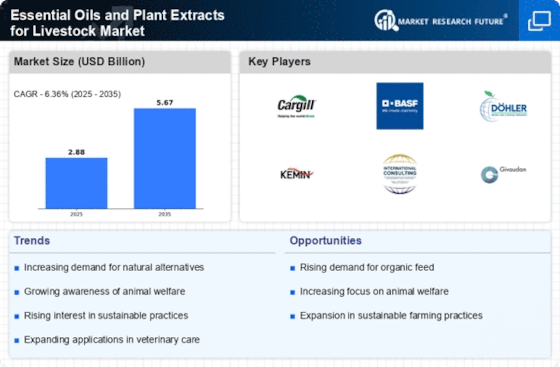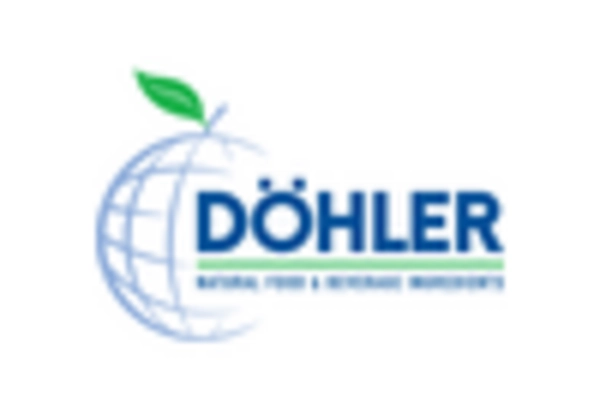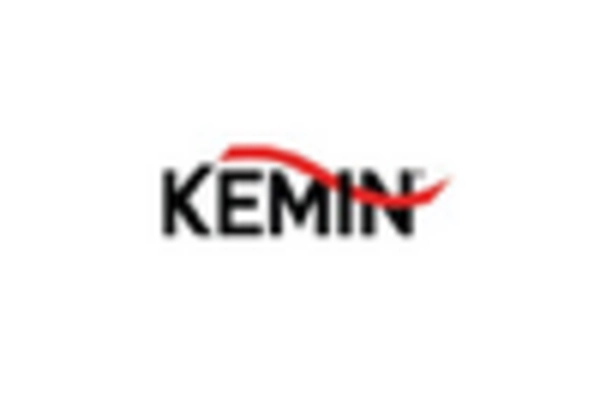-
Executive Summary
-
Scope of the Report
-
Market Definition
-
Scope of the Study
- Research Objectives
- Assumptions &
-
Limitations
-
Market Structure
-
Market Research Methodology
-
Research Process
-
Secondary Research
-
Primary Research
-
Forecast Model
-
Market Landscape
-
Supply Chain Analysis
- Raw Material Suppliers
- Manufacturers/Producers
- Distributors/Retailers/Wholesalers/E-Commerce
- End Users
-
Porter’s Five
- Bargaining Power of Suppliers
- Threat of Substitutes
- Internal Rivalry
-
Forces Analysis
-
Threat of New Entrants
-
Bargaining Power of Buyers
-
Market Dynamics of the Global Essential Oils &
-
Plant Extracts for Livestock Market
-
Introduction
-
Drivers
-
Restraints
-
Opportunities
-
Challenges
-
Global Essential Oils & Plant Extracts for
-
Livestock Market, by Type
-
Introduction
-
Plant Extracts
- Market Estimates & Forecast, 2023–2032
- Market Estimates &
-
Forecast, by Region, 2023–2032
-
Essential Oils
- Market Estimates & Forecast, 2023–2032
- Market Estimates
-
& Forecast, by Region, 2023–2032
-
Global Essential Oils & Plant Extracts for
-
Livestock Market, by Form
-
Introduction
-
Solid/Powder
- Market Estimates & Forecast, 2023–2032
- Market Estimates &
-
Forecast, by Region, 2023–2032
-
Liquid
- Market Estimates & Forecast, 2023–2032
- Market Estimates
-
& Forecast, by Region, 2023–2032
-
Global Essential Oils & Plant Extracts for
-
Livestock Market, by Livestock
-
Introduction
-
Swine
- Market Estimates & Forecast, by Region,
- Market Estimates & Forecast, by Region,
- Market Estimates & Forecast, by Region,
- Market Estimates & Forecast, by Region,
- Market Estimates & Forecast, by Region,
-
Market Estimates & Forecast, 2023–2032
-
Poultry
-
Market Estimates & Forecast, 2023–2032
-
Ruminants
-
Market Estimates & Forecast, 2023–2032
-
Aquaculture
-
Market Estimates & Forecast, 2023–2032
-
Others
-
Market Estimates & Forecast, 2023–2032
-
Global Essential Oils & Plant Extracts for Livestock Market, by Region
-
Introduction
-
North America
- Market Estimates
- Market Estimates & Forecast, by Type, 2023–2032
- Market Estimates
- Market Estimates & Forecast, by Livestock, 2023–2032
- US
- Canada
- Mexico
-
& Forecast, 2023–2032
-
& Forecast, by Form, 2023–2032
-
Forecast, 2023–2032
-
& Forecast, by Form, 2023–2032
-
& Forecast, 2023–2032
-
& Forecast, by Form, 2023–2032
-
& Forecast, 2023–2032
-
& Forecast, by Form, 2023–2032
-
Europe
- Market Estimates
- Market Estimates & Forecast, by Type, 2023–2032
- Market Estimates
- Market Estimates & Forecast, by Livestock, 2023–2032
- Germany
- France
- Italy
- Spain
- UK
-
& Forecast, 2023–2032
-
& Forecast, by Form, 2023–2032
-
& Forecast, 2023–2032
-
& Forecast, by Form, 2023–2032
-
& Forecast, 2023–2032
-
& Forecast, by Form, 2023–2032
-
& Forecast, 2023–2032
-
& Forecast, by Form, 2023–2032
-
& Forecast, 2023–2032
-
& Forecast, by Form, 2023–2032
-
Forecast, 2023–2032
-
& Forecast, by Form, 2023–2032
-
Rest of Europe
-
Market Estimates & Forecast, 2023–2032
-
Market Estimates & Forecast, by Form, 2023–2032
-
Asia-Pacific
-
Market Estimates & Forecast, 2023–2032
-
& Forecast, by Form, 2023–2032
-
& Forecast, 2023–2032
-
& Forecast, by Form, 2023–2032
-
& Forecast, 2023–2032
-
& Forecast, by Form, 2023–2032
-
& Forecast, 2023–2032
-
& Forecast, by Form, 2023–2032
-
New Zealand
-
Market Estimates & Forecast, 2023–2032
-
Market Estimates & Forecast, by Livestock,
-
Market Estimates & Forecast, by Type, 2023–2032
-
Market Estimates
-
Market Estimates & Forecast, by Livestock, 2023–2032
-
China
-
Market Estimates
-
Market Estimates & Forecast, by Type, 2023–2032
-
Market Estimates
-
Market Estimates & Forecast, by Livestock, 2023–2032
-
India
-
Market Estimates
-
Market Estimates & Forecast, by Type, 2023–2032
-
Market Estimates
-
Market Estimates & Forecast, by Livestock, 2023–2032
-
Japan
-
Market Estimates
-
Market Estimates & Forecast, by Type, 2023–2032
-
Market Estimates
-
Market Estimates & Forecast, by Livestock, 2023–2032
-
Australia &
-
Market Estimates & Forecast, by Type,
-
Market Estimates & Forecast, by Form, 2023–2032
-
Rest of Asia-Pacific
-
Market Estimates & Forecast, 2023–2032
-
Market Estimates & Forecast, by Livestock,
-
Market Estimates & Forecast, by Type,
-
Market Estimates & Forecast, by Form, 2023–2032
-
Rest of the World (RoW)
-
Forecast, by Type, 2023–2032
-
& Forecast, by Livestock, 2023–2032
-
& Forecast, by Type, 2023–2032
-
& Forecast, by Livestock, 2023–2032
-
& Forecast, by Type, 2023–2032
-
& Forecast, by Livestock, 2023–2032
-
& Forecast, by Type, 2023–2032
-
& Forecast, by Livestock, 2023–2032
-
Market Estimates & Forecast, by Livestock,
-
Market Estimates & Forecast, 2023–2032
-
Market Estimates &
-
Market Estimates & Forecast, by Form, 2023–2032
-
Market Estimates
-
South America
-
Market Estimates & Forecast, 2023–2032
-
Market Estimates
-
Market Estimates & Forecast, by Form, 2023–2032
-
Market Estimates
-
Middle East
-
Market Estimates & Forecast, 2023–2032
-
Market Estimates
-
Market Estimates & Forecast, by Form, 2023–2032
-
Market Estimates
-
Africa
-
Market Estimates & Forecast, 2023–2032
-
Market Estimates
-
Market Estimates & Forecast, by Form, 2023–2032
-
Market Estimates
-
Company Landscape
-
Introduction
-
Market Strategy
-
Key Development Analysis
-
(Expansions/Mergers & Acquisitions/Joint Ventures/New
-
Product Developments/Agreements/Investments)
-
Company Profiles
-
Manghebati
- Company Overview
- Financial Updates
- Product/Business Segment Overview
- Strategy
- Key Developments
- SWOT Analysis
-
Olmix Group
- Company Overview
- Financial Updates
- Product/Business
- Strategy
- Key Developments
- SWOT Analysis
-
Segment Overview
-
Strategy
-
Key Developments
-
SWOT Analysis
-
Trouw Nutrition B.V.
-
Company Overview
-
Financial Updates
-
Product/Business Segment Overview
-
DuPont de Nemours, Inc.
- Company Overview
- Financial Updates
- Product/Business Segment Overview
- Strategy
- Key Developments
- SWOT Analysis
-
Orffa
- Company Overview
- Financial Updates
- Product/Business
- Strategy
- Key Developments
- SWOT Analysis
-
Segment Overview
-
Strategy
-
Key Developments
-
SWOT Analysis
-
Herbavita
-
Company Overview
-
Financial Updates
-
Product/Business Segment Overview
-
Kemin Industries, Inc.
- Company Overview
- Financial Updates
- Product/Business Segment Overview
- Strategy
- Key Developments
- SWOT Analysis
-
CCPA GROUP
- Company Overview
- Financial Updates
- Product/Business
- Company Overview
- Financial Updates
- Product/Business Segment Overview
- Strategy
- Key Developments
- SWOT Analysis
-
Segment Overview
-
Strategy
-
Key Developments
-
SWOT Analysis
-
Foreverest Resources Ltd.
-
Martin Bauer Group
- Company Overview
- Financial Updates
- Product/Business
- Company Overview
- Financial Updates
- Product/Business Segment Overview
- Strategy
- Key Developments
- SWOT Analysis
-
Segment Overview
-
Strategy
-
Key Developments
-
SWOT Analysis
-
Provimi North America, Inc.
-
Destilaciones Bordas
- Strategy
- Key Developments
- SWOT Analysis
-
Chinchurreta SA
-
Company Overview
-
Financial Updates
-
Product/Business Segment Overview
-
Delacon Biotechnik GmbH
- Company Overview
- Financial Updates
- Product/Business Segment Overview
- Strategy
- Key Developments
- SWOT Analysis
-
BIOMIN Holding
- Strategy
- Key Developments
- SWOT Analysis
-
GmbH
-
Company Overview
-
Financial Updates
-
Product/Business Segment Overview
-
Conclusion
-
-
LIST OF TABLES
-
Global Essential Oils & Plant Extracts for Livestock
-
Market, by Region, 2023–2032 (USD Million)
-
Global Essential Oils & Plant Extracts
-
for Livestock Market, by Type, 2023–2032 (USD Million)
-
Global Essential Oils & Plant Extracts
-
for Livestock Market, by Form, 2023–2032 (USD Million)
-
Global Essential Oils & Plant Extracts
-
for Livestock Market, by Livestock, 2023–2032 (USD Million)
-
North America: Essential
-
Oils & Plant Extracts for Livestock Market, by Country, 2023–2032 (USD
-
Million)
-
Table
-
North America: Essential Oils & Plant Extracts for Livestock Market, by Type,
-
North America: Essential Oils & Plant Extracts for Livestock
-
Market, by Form, 2023–2032 (USD Million)
-
North America: Essential Oils & Plant
-
Extracts for Livestock Market, by Livestock, 2023–2032 (USD Million)
-
US: Essential
-
Oils & Plant Extracts for Livestock Market, by Type, 2023–2032 (USD Million)
-
US: Essential
-
Oils & Plant Extracts for Livestock Market, by Form, 2023–2032 (USD Million)
-
US: Essential
-
Oils & Plant Extracts for Livestock Market, by Livestock, 2023–2032 (USD
-
Million)
-
Table
-
Canada: Essential Oils & Plant Extracts for Livestock Market, by Type, 2023–2032
-
(USD Million)
-
Table
-
Canada: Essential Oils & Plant Extracts for Livestock Market, by Form, 2023–2032
-
(USD Million)
-
Table
-
Canada: Essential Oils & Plant Extracts for Livestock Market, by Livestock,
-
Mexico: Essential Oils & Plant Extracts for Livestock
-
Market, by Type, 2023–2032 (USD Million)
-
Mexico: Essential Oils & Plant Extracts
-
for Livestock Market, by Form, 2023–2032 (USD Million)
-
Mexico: Essential Oils & Plant Extracts
-
for Livestock Market, by Livestock, 2023–2032 (USD Million)
-
Europe: Essential Oils
-
& Plant Extracts for Livestock Market, by Country, 2023–2032 (USD Million)
-
Europe: Essential
-
Oils & Plant Extracts for Livestock Market, by Type, 2023–2032 (USD Million)
-
Europe: Essential
-
Oils & Plant Extracts for Livestock Market, by Form, 2023–2032 (USD Million)
-
Europe: Essential
-
Oils & Plant Extracts for Livestock Market, by Livestock, 2023–2032 (USD
-
Million)
-
Table
-
Germany: Essential Oils & Plant Extracts for Livestock Market, by Type, 2023–2032
-
(USD Million)
-
Table
-
Germany: Essential Oils & Plant Extracts for Livestock Market, by Form, 2023–2032
-
(USD Million)
-
Table
-
Germany: Essential Oils & Plant Extracts for Livestock Market, by Livestock,
-
France: Essential Oils & Plant Extracts for Livestock
-
Market, by Type, 2023–2032 (USD Million)
-
France: Essential Oils & Plant Extracts
-
for Livestock Market, by Form, 2023–2032 (USD Million)
-
France: Essential Oils & Plant Extracts
-
for Livestock Market, by Livestock, 2023–2032 (USD Million)
-
Italy: Essential Oils
-
& Plant Extracts for Livestock Market, by Type, 2023–2032 (USD Million)
-
Italy: Essential
-
Oils & Plant Extracts for Livestock Market, by Form, 2023–2032 (USD Million)
-
Italy: Essential
-
Oils & Plant Extracts for Livestock Market, by Livestock, 2023–2032 (USD
-
Million)
-
Table
-
Spain: Essential Oils & Plant Extracts for Livestock Market, by Type, 2023–2032
-
(USD Million)
-
Table
-
Spain: Essential Oils & Plant Extracts for Livestock Market, by Form, 2023–2032
-
(USD Million)
-
Table
-
Spain: Essential Oils & Plant Extracts for Livestock Market, by Livestock,
-
UK: Essential Oils & Plant Extracts for Livestock Market,
-
by Type, 2023–2032 (USD Million)
-
UK: Essential Oils & Plant Extracts for Livestock
-
Market, by Form, 2023–2032 (USD Million)
-
UK: Essential Oils & Plant Extracts
-
for Livestock Market, by Livestock, 2023–2032 (USD Million)
-
Rest of Europe: Essential
-
Oils & Plant Extracts for Livestock Market, by Type, 2023–2032 (USD Million)
-
Rest of Europe:
-
Essential Oils & Plant Extracts for Livestock Market, by Form, 2023–2032
-
(USD Million)
-
Table
-
Rest of Europe: Essential Oils & Plant Extracts for Livestock Market, by
-
Livestock, 2023–2032 (USD Million)
-
Asia-Pacific: Essential Oils & Plant Extracts
-
for Livestock Market, by Country, 2023–2032 (USD Million)
-
Asia-Pacific: Essential
-
Oils & Plant Extracts for Livestock Market, by Type, 2023–2032 (USD Million)
-
Asia-Pacific:
-
Essential Oils & Plant Extracts for Livestock Market, by Form, 2023–2032
-
(USD Million)
-
Table
-
Asia-Pacific: Essential Oils & Plant Extracts for Livestock Market, by Livestock,
-
China: Essential Oils & Plant Extracts for Livestock Market,
-
by Type, 2023–2032 (USD Million)
-
China: Essential Oils & Plant Extracts for
-
Livestock Market, by Form, 2023–2032 (USD Million)
-
China: Essential Oils & Plant Extracts
-
for Livestock Market, by Livestock, 2023–2032 (USD Million)
-
India: Essential Oils
-
& Plant Extracts for Livestock Market, by Type, 2023–2032 (USD Million)
-
India: Essential
-
Oils & Plant Extracts for Livestock Market, by Form, 2023–2032 (USD Million)
-
India: Essential
-
Oils & Plant Extracts for Livestock Market, by Livestock, 2023–2032 (USD
-
Million)
-
Table
-
Japan: Essential Oils & Plant Extracts for Livestock Market, by Type, 2023–2032
-
(USD Million)
-
Table
-
Japan: Essential Oils & Plant Extracts for Livestock Market, by Form, 2023–2032
-
(USD Million)
-
Table
-
Japan: Essential Oils & Plant Extracts for Livestock Market, by Livestock,
-
Rest of Asia-Pacific: Essential Oils & Plant Extracts
-
for Livestock Market, by Type, 2023–2032 (USD Million)
-
Rest of Asia-Pacific: Essential Oils &
-
Plant Extracts for Livestock Market, by Form, 2023–2032 (USD Million)
-
Rest of Asia-Pacific:
-
Essential Oils & Plant Extracts for Livestock Market, by Livestock, 2023–2032
-
(USD Million)
-
Table
-
Rest of the World (RoW): Essential Oils & Plant Extracts for Livestock Market,
-
by Country, 2023–2032 (USD Million)
-
Rest of the World (RoW): Essential Oils
-
& Plant Extracts for Livestock Market, by Type, 2023–2032 (USD Million)
-
Rest of the
-
World (RoW): Essential Oils & Plant Extracts for Livestock Market, by Form,
-
Rest of the World (RoW): Essential Oils & Plant Extracts
-
for Livestock Market, by Livestock, 2023–2032 (USD Million)
-
South America: Essential
-
Oils & Plant Extracts for Livestock Market, by Type, 2023–2032 (USD Million)
-
South America:
-
Essential Oils & Plant Extracts for Livestock Market, by Form, 2023–2032
-
(USD Million)
-
Table
-
South America: Essential Oils & Plant Extracts for Livestock Market, by Livestock,
-
Middle East: Essential Oils & Plant Extracts for Livestock
-
Market, by Type, 2023–2032 (USD Million)
-
Middle East: Essential Oils & Plant
-
Extracts for Livestock Market, by Form, 2023–2032 (USD Million)
-
Middle East:
-
Essential Oils & Plant Extracts for Livestock Market, by Livestock, 2023–2032
-
(USD Million)
-
Table
-
Africa: Essential Oils & Plant Extracts for Livestock Market, by Type, 2023–2032
-
(USD Million)
-
Table
-
Africa: Essential Oils & Plant Extracts for Livestock Market, by Form, 2023–2032
-
(USD Million)
-
Table
-
Africa: Essential Oils & Plant Extracts for Livestock Market, by Livestock,
-
LIST OF FIGURES
-
Global Essential Oils & Plant Extracts
-
for Livestock Market Segmentation
-
Forecast Research Methodology
-
Five Forces Analysis of the Global Essential
-
Oils & Plant Extracts for Livestock Market
-
Value Chain of the Global Essential Oils
-
& Plant Extracts for Livestock Market
-
Share of the Global Essential Oils &
-
Plant Extracts for Livestock Market in 2020, by Country (%)
-
Global Essential Oils & Plant Extracts
-
for Livestock Market, by Region, 2023–2032,
-
Global Essential Oils & Plant Extracts
-
for Livestock Market Size, by Type, 2020
-
Share of the Global Essential Oils & Plant
-
Extracts for Livestock Market, by Type, 2023–2032 (%)
-
Global Essential Oils & Plant Extracts
-
for Livestock Market Size, by Livestock, 2020
-
Share of the Global Essential Oils &
-
Plant Extracts for Livestock Market, by Livestock, 2023–2032 (%)
-
Global Essential
-
Oils & Plant Extracts for Livestock Market Size, by Form, 2020
-
Share of the Global
-
Essential Oils & Plant Extracts for Livestock Market, by Form, 2023–2032
-
(%)


















Leave a Comment